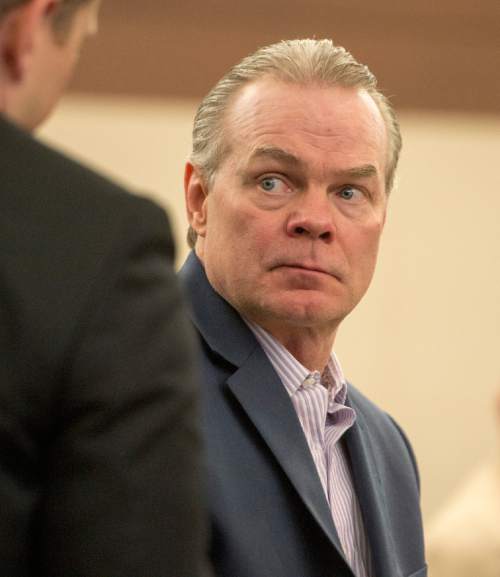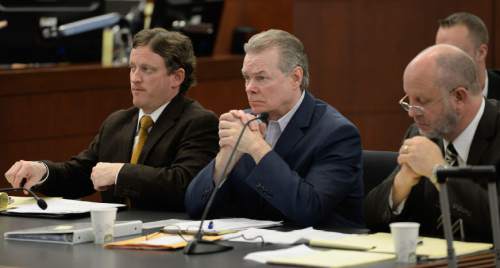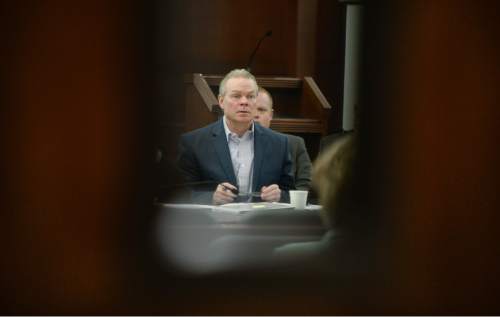This is an archived article that was published on sltrib.com in 2016, and information in the article may be outdated. It is provided only for personal research purposes and may not be reprinted.
Several witnesses called to testify in Douglas Anderson Lovell's death penalty trial last year say they faced a hard choice: Either testify on behalf of a murderer they had come to know as a friend or appease their leaders within The Church of Jesus Christ of Latter-day Saints and stay silent.
Lovell is appealing the outcome of his 2015 trial in which jurors sentenced him to be executed for the 1985 killing of Joyce Yost. In newly filed appellate court papers, the death row inmate accuses the Mormon church and its attorneys of meddling in his trial by telling his former bishops not to testify or to limit what they said on the stand.
A former mentor even came to Lovell in tears the day before the start of the trial and asked the inmate to not call him as a character witness, Lovell wrote in an affidavit filed with the Utah Supreme Court. The man told Lovell that a "member above him" in the church had told him he could not testify.
"It was obvious to me that [he] was torn between testifying for me and his loyalty to obey his church leaders," Lovell wrote. "My heart truly ached for [him] because I knew him well enough to know that he was devastated."
'It got so ridiculous ... ' • And he wasn't the only Mormon who was told not to testify. Lovell's appellate attorney, Samuel Newton, wrote in court papers that four other bishops and a woman who was serving an LDS mission at the time of the trial also reported they were told to either not testify or give only short answers, so it would not appear they were representing the church while approving of a murderer. One bishop reported that a member of the Quorum of the Seventy, a senior administrative body in the LDS Church, had contacted him and instructed him not to testify.
"The church, out of concern for its policies, pressured witnesses not to testify or cooperate with Mr. Lovell," Newton wrote. "And put witnesses in the position of having to disobey their church leaders to support Mr. Lovell."
When the four church members who did testify took the stand, attorneys on both sides made a point of letting jurors know they were there under subpoena and did not represent the views of the Utah-based faith, which has a neutral stance on the death penalty. One juror later wrote in an affidavit that the repeated references had a negative impact on him and the other jurors.
"It felt to me like [Deputy Weber County Attorney Jeffrey] Thomson was trying to make sure that, by the bishops 'forgiving and liking' Doug, it didn't mean the LDS Church would forgive/like Doug because he was a convicted murderer," the juror wrote. "It was like the prosecutor was trying so hard to make sure their testimony was separated from official church business and it got so ridiculous by the end."
Newton said the church's lawyers, with the law firm Kirton McConkie, have continued to interfere with Lovell's case by blocking the appellate attorney's attempts to contact those same bishops and get more information from them as he prepares Lovell's appeal.
In a written statement, LDS Church spokesman Eric Hawkins said any limitations to witness testimony were agreed to by the church and Lovell's trial attorneys.
"Church leaders do not generally participate in legal proceedings in which the church is not directly involved," Hawkins said. "In this case, these leaders were required by subpoena to appear in court. Their statements represent their personal experiences and opinions. They do not speak for the church. Our hearts go out to the victims of this unspeakable crime."
Through his attorney, Lovell declined to comment for this story because he did not want to cause "unnecessary pain" to Yost's family. Newton said in a statement to The Salt Lake Tribune that Lovell has great respect for the LDS Church and a love for the bishops who worked with him throughout the years and became his friends.
"He was saddened, however, that the church, institutionally, took steps to limit or prevent these bishops from testifying on his behalf at his trial and on appeal," Newton said. "He is hopeful that the church will, if the Supreme Court grants his motion for remand, allow these former leaders to fully testify about their love for Mr. Lovell, the changes they have observed in him and their belief that he could succeed in society."
Fired public defender • Newton is asking the Utah Supreme Court to remand the case back to the 2nd District Court so an evidentiary hearing can be held and witnesses can be questioned as he mounts an ineffective-assistance-of-counsel claim.
In the motion, Newton also asserts that one of Lovell's trial attorneys, Sean Young, failed to object to the church interference until after the trial. The appellate attorney alleges that Young did virtually no work on his case and "wholly abandoned his role as counsel."
After the trial, Lovell received a number of letters from supporters who said they wanted to testify about how he was a changed man — but added that his defense team never contacted them. They would have said that Lovell's life had worth, and that Lovell was remorseful for his crimes and could be rehabilitated, according to their letters and affidavits.
Lovell's lead trial attorney, Michael Bouwhuis, wrote in an affidavit that Young, his co-counsel, was assigned to interview and prepare 18 witnesses, including former church leaders, Lovell's family members, and an inmate who said Lovell positively affected his life.
Of those 18, only two have said that they were contacted by Young before trial — but the conversations were brief and mostly concerned when they would testify, not the substance of what they would say.
Young's public defender contract was terminated after Lovell's trial, Bouwhuis wrote, when it came to light that the attorney "did not speak with a substantial number of witnesses assigned to him in this case."
Young did not respond to a request by The Tribune seeking comment. Weber County Attorney Chris Allred confirmed Friday that Young's contract was terminated. Allred declined to comment on the assertions in Lovell's motion because he had not read the filing.
Lovell wrote in his affidavit that Young made it appear as if he had spoken to the potential witnesses and that he reported that they did not wish to testify. Lovell also said that he felt Young did not adequately question or cross-examine witnesses at trial.
"In my case, it would be hard for any jury to see me as a human being and a life worth saving through the testimony of those who knew me well because my attorney, Sean Young, did not contact, prepare and get my witnesses to court," Lovell wrote.
Rape and murder • In April 1985, Lovell followed Yost, 39, home from a Clearfield restaurant, kidnapped her from her apartment parking lot and sexually assaulted her in the parking lot and at his home, according to trial testimony.
After she reported the crime, Lovell began to plot the woman's death to keep her from testifying at his upcoming trial, according to testimony at Lovell's murder trial. He tried twice to hire men to kill the woman, then decided to do it himself on Aug. 10, 1985.
He kidnapped the woman again from her South Ogden apartment and took her to the mountains east of Ogden, where he strangled her and left her body under handfuls of dirt and leaves.
The body was never found — despite an extensive search of the area by police in 1993, after Lovell struck a plea deal that spared him the death penalty if he could lead authorities to her body.
After the fruitless 1993 search, an Ogden judge sentenced Lovell to death by lethal injection. But, in 2011, the Utah Supreme Court ruled Lovell could withdraw his guilty plea because he should have been better informed of his rights during court proceedings.
Despite Lovell's efforts to prevent Yost from testifying against him in the rape case, he was convicted by a jury of aggravated kidnapping and aggravated sexual assault in December 1985, with the help of a transcript of Yost's preliminary hearing testimony.
Twitter: @jm_miller







